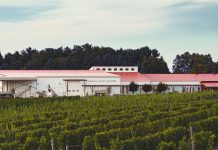
Having received a bachelor’s degree in mathematics from Aquinas College in 2011, Kristin Kohane, 31, had been working as an accounting associate for almost seven years when she decided it was time for a career change.
“I was not happy at my previous career and knew I had to do something that made me enjoy what I was doing,” she said via email. “I always loved going wine tasting up north in Traverse City and thought I would look into what I could do with wine.”
She did her research and came across the Wine & Viticulture Technology program at Lake Michigan College, which offers the only commercial teaching winery in the state. She met with the program’s director, Mike Moyer, shortly after, and the rest is history.
Once she graduated in 2019, she began working full time as an enologist at St. Julian Winery, where she has been for the past two years.
“While I was in school at Lake Michigan College, I ended up emailing the assistant winemaker from St. Julian, Kyle, to see if I could help him grow some grapes at their Rockford location as some practice for myself,” Kohane says. “He ended up asking me to apply and interview for their enologist position.”
Kohane says she owes her current position to the one-of-a-kind training she received from Lake Michigan College.
“As the enologist at St. Julian Winery, the enology courses (at Lake Michigan College) were very beneficial, because it goes hand in hand with what I am doing now,” she says. “But in order to really understand the whole winemaking process, you should know where these grapes come from and how they grow, which is why the viticulture courses were beneficial as well.”
Growing the Next Generation

Moyer was introduced to Lake Michigan College purely by coincidence. In 2014, he was working as an associate winemaker and enologist at Figgins Family Wine Estates in Walla Walla, Washington, when representatives from the college came by to tour the Figgins family-owned Leonetti Cellar. Moyer’s boss invited him to join the group for a glass of wine after work, and they began talking about the plans for a new viticulture program way across the country in Michigan. At the time, the college still hadn’t found someone to actually run it.
“I was really intrigued by it,” Moyer says. “It sounded like a really good opportunity, but I was a little bit nervous about it because it was in Michigan, and so I applied for the job, and we had a first interview and things went really well.
“I said, ‘Well, you know, I really don’t know what I’m getting myself into, so if I can ask a favor of you, can you guys send me some wine?’ ” Moyer recalls with a laugh. “And they did. A lot of local wineries put together a case of wine and they sent it to me.
“I was expecting to get, you know, maybe some fruit wines, maybe some high French American-hybrid wines and maybe a Riesling. I was surprised that in the box was a bunch of dry red wines: Cabernet Franc, Merlot, Syrah. There were a couple white wines, too, but it was mostly dry red wines. I opened a couple of them and tasted them and I was just blown away that they can make quality Cabernet Franc and Syrah here.”
That sealed the deal for him in terms of taking the job, Moyer says. If Michigan possessed temperatures warm enough to produce such high-quality reds, “anything is possible,” he thought. By January 2015, Moyer had packed up and moved his family to the Mitten State.
“There aren’t a lot of programs like this in the country,” he says, “and I looked at Michigan and I was impressed by the quality of the wines and also by the fact that it’s a region that’s under the radar in the wine world and not really well known.
“That presents a lot of opportunities to influence and direct where the industry goes and how to train the next generation of industry professionals to fuel that growth.”
Abundant Opportunities

As of late April, 29 people had graduated from Lake Michigan College’s Wine & Viticulture Technology program, which grants an associate degree in applied science, while 70 full-time students have taken classes so far. The commercial teaching winery and tasting room that allow students to gain so much hands-on experience, known professionally as Lake Michigan Vintners, are owned and operated by a parent corporation of the college. This makes Lake Michigan Vintners affiliates of the college rather than in-house facilities, but both students and instructors are involved in all steps of the winemaking process all the same. Additionally, Moyer says the winery, which produces about 500-1,000 cases per year, is self-sustaining in terms of revenue.
“The students will start off with the fall harvest operations and the crushing, destemming, pressing, managing fermentation — you know, those types of activities — and then we move into the following semester,” says Moyer, who teaches the viticulture courses. “In the winter/spring, we move into filtration and bottling, and also there’s some routine analysis and quality control that goes on at that time as well.
“In the summertime, we’re in the vineyard, with pruning, and then also just all throughout the year the students are assigned their own individual vines where they take care of them all year.”
Because of the commercial aspect, however, students don’t have complete control over the varietals they get to work with: They have to be mindful of which wines sell the best. “Everything is coordinated,” Moyer says.
That coordination includes partnerships with local wineries that help students get professional experience even before they graduate. Students spend the fall semester of their second year working at any winery they choose, whether within the state or elsewhere. For Kohane, this meant part-time work as a tasting room associate and then an assistant winemaker for 12 Corners Vineyards. Additionally, Michigan wineries are the reason the program exists in the first place.
Becca Sonday, program assistant, says it was roughly eight or nine years ago when a number of local wineries noted the growing interest in the industry and the corresponding need for qualified staff. Lake Michigan College’s program fulfills that need, she says, while also inspiring students to start their own operations. Among Wine & Viticulture graduates are several owners of currently operating or in-progress wineries or vineyards: Adam McBride of Hickory Creek, Sue Chilton of Shiny Quarter Vineyard, Daniel Berghoff of Madron Lake Hills Vineyard and Analisa Leppanen of Le Reve Winery.
“I think between 2013 and 2020, the number of wineries in Michigan went up like 250 percent or something like that,” Sonday says. “There’s just so many wineries, and to be known as a winemaking region, to be known for quality products, to be known nationally and internationally, the perception wineries have is that we need trained people, we need people who understand the art, the business, the science of winemaking. Not just passionate people — passion is very important — but the educational foundation is important, too.”












Facebook Comments